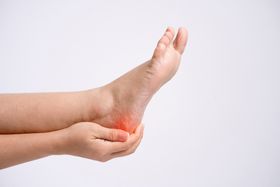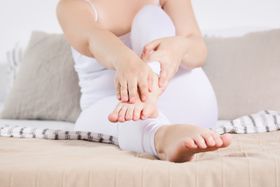How to Relieve Foot Pain From High Arches
Pain from high arches can be managed using non-steroidal anti-inflammatory drugs (NSAIDs), ice, and night splinting. You can also use arch supports, and ...
Published January 26, 2022
Pes cavus (or high arches) puts undue pressure on the ankle and knee joints. This can lead to significant pain and discomfort when performing activities of daily living. It can also lead to other conditions like metatarsalgia, plantar fasciitis, hammertoes, ankle instability, claw toes, etc., all of which reduce the quality of life.
If you notice you have high arches in your foot that are causing you pain, you must manage them early as proper management can lead to improved quality of life.
Treating Pain From High Arches
Pain from high arches can be treated with a combination of at-home treatments and professional medical attention.
Home Remedies for High Arches
Though these remedies won't cure your high arches, they can bring some pain relief:
- Non-steroidal anti-inflammatory drugs (NSAIDs)
- Ice
- Night splinting (braces that hold the toes in a certain position)
Medical and Professional Assistance for High Arches
When home treatment doesn’t yield the desired result, seek expert advice. Here’s what you can expect:
- Orthotics Orthotics provide additional support and cushioning to the feet. While over-the-counter (OTC) orthotics are an option, custom-designed orthotics provide the best results as they are molded to your unique foot shape and size. Upstep arch supports for high arches help redistribute pressure and stress when walking or running and are well-cushioned, breathable, comfortable, stable, and allow more flexibility.
- Physical therapy A PA physiotherapist will use stretching and strengthening exercises to treat pes cavus symptoms. A physiotherapist can also prescribe a brace for the foot and ankle to ease high arch symptoms.
- Surgery If the condition doesn’t improve with non-surgical treatment, surgery to alter soft tissue, remove bones from certain areas, or fuse joints may be necessary.
Managing High Arch Pain
Among other causes, genetics is supposed to play a causative role when it comes to high arches. While the cause may be unavoidable, proper management is possible with monitoring and treatments. The earlier the intervention, the better the treatment outcome will be.
Related Articles

Bunions: Symptoms, Causes, and Treatment
Babafemi Adebajo
December 18, 2024

Knee Pain When Squatting: Causes and How to Fix It
Babafemi Adebajo
December 12, 2024

What Is a Stone Bruise and What Can You Do About It?
Upstep Staff
October 16, 2025

Corns vs. Bunions: Similarities and Differences
Janik Sundstrom
January 30, 2024

Insoles for Normal Everyday Activity—2026 Review
Janik Sundstrom
December 9, 2024
Related Posts
Babafemi Adebajo
Do You Need Arch Support if You Have High Arches?
Babafemi Adebajo
How to Relieve Flat Feet and Fallen Arches Pain
Babafemi Adebajo
What Causes Pain in the Arch of Your Foot After Running?
Babafemi Adebajo
How to Relieve Foot and Leg Pain From Standing All Day
Babafemi Adebajo
How to Stretch the Arch of Your Foot
Babafemi Adebajo
Does Apple Cider Vinegar Help Plantar Fibroma?
Babafemi Adebajo
How to Relieve Foot Pain From Cycling
Babafemi Adebajo



